Senior-year Stress: Here's What Students Say and Do About It

What did CollegeData users find most stressful about their senior year of high school and what advice do they have for the high school graduates of 2026? Here are the results of CollegeData’s 2025 Senior Stress Survey.
If you’re a high school student, you are probably well acquainted with stress. According to the American Institute of Stress, 75 percent of high school students in 2024 reported feeling “consistently” stressed out.
WHY IS SENIOR YEAR OF HIGH SCHOOL SO STRESSFUL?
Senior year can be one of the most stressful times in a student’s life, especially for those applying to college. In addition to juggling schoolwork, family responsibilities, social relationships, jobs, and extracurricular activities, many high school seniors are also navigating an unfamiliar and highly competitive college admissions landscape, figuring out how to finance their education, and making big decisions about their future.
We surveyed* registered users of CollegeData who graduated from high school in 2025 to find out what caused them stress, how stress affected them, and what resources helped them deal with stress.
What Stressed Out Seniors Most?
The biggest senior-year stressors fell into the following areas:
- Applying to college
- Paying for college
- School/Life balance
- Class workload/rigor
- Life after graduation
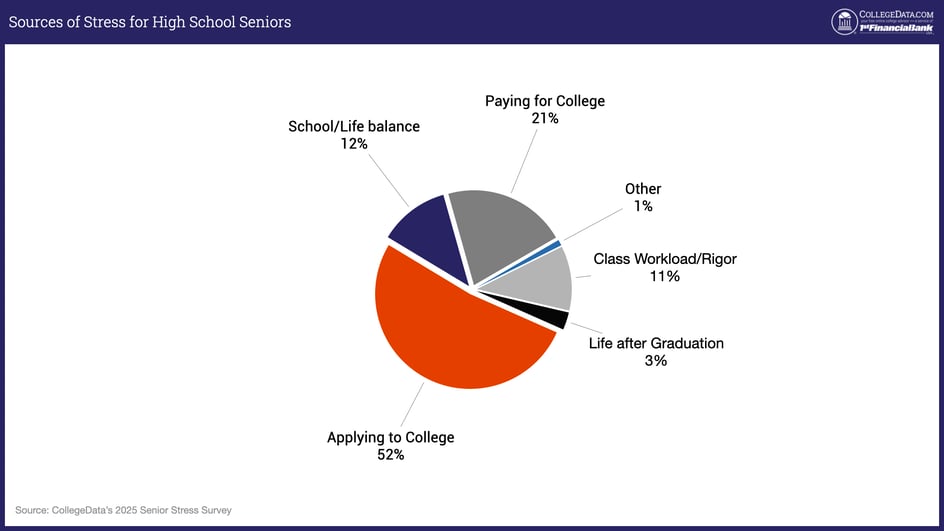
Below is more detail on how students responded within each category.
STRESSOR #1: APPLYING TO COLLEGE
For the fourth year in a row, applying to college was ranked by survey respondents as the most stressful part of senior year. The total percentage (52 percent) includes students who said applying to college in general was their biggest stressor (33 percent) as well as students who cited specific aspects of applying to college, namely SAT/ACT tests (3 percent), competition for admission (6 percent) not getting accepted (8 percent), and family pressure or conflict related to applying to college (2 percent).
- “I was incredibly stressed about not getting into the college I wanted, feeling like a failure, not being ready for college, comparing myself to peers, and transitioning away from home.”
- “I felt that if I didn’t get into college, my future would be over before it began.”
- “I was worried about not being able to get into a good university [...] because a lot of social media warned of how difficult and stressful it would be and gave a lot of scary stories of people not being accepted.”
In a separate question, we asked students what single aspect of applying to college was the most stressful. Over half (53 percent) said college essays.
- “The stress of boiling down my entire life essence into 650 words or less was a lot of pressure.”
- “Mentally, I felt exhausted after every essay I wrote.”
- “I was really worried about whether my essays would be good enough to get into the college or program I was applying for.”
Meeting application deadlines was most stressful for 12 percent of survey respondents. Another 12 percent were most anxious about applying for financial aid. Students also cited researching colleges (10 percent), asking for letters of recommendation (8 percent), and preparing for interviews (1 percent) as stressors.
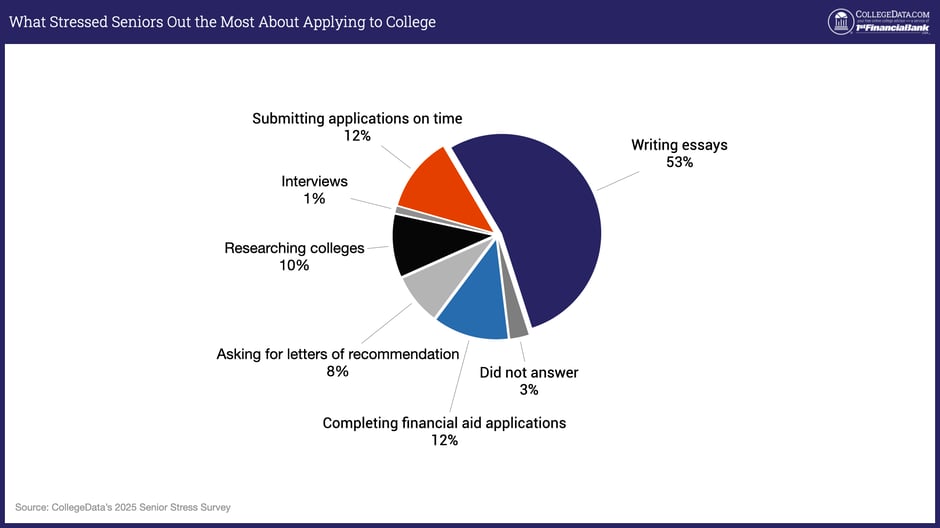
STRESSOR #2: Paying for college
While applying to college brings plenty of stress, paying for it can be an additional worry for some students, even long before they’ve made their college lists. As reported by the College Board in its 2024-2025 annual survey of colleges, the average annual college budget (including tuition and fees, room and board, books and supplies, transportation and personal expenses) averaged almost $30,000 for students attending in-state public universities and almost $63,000 for students attending private colleges. These costs spark anxiety for many students and families.
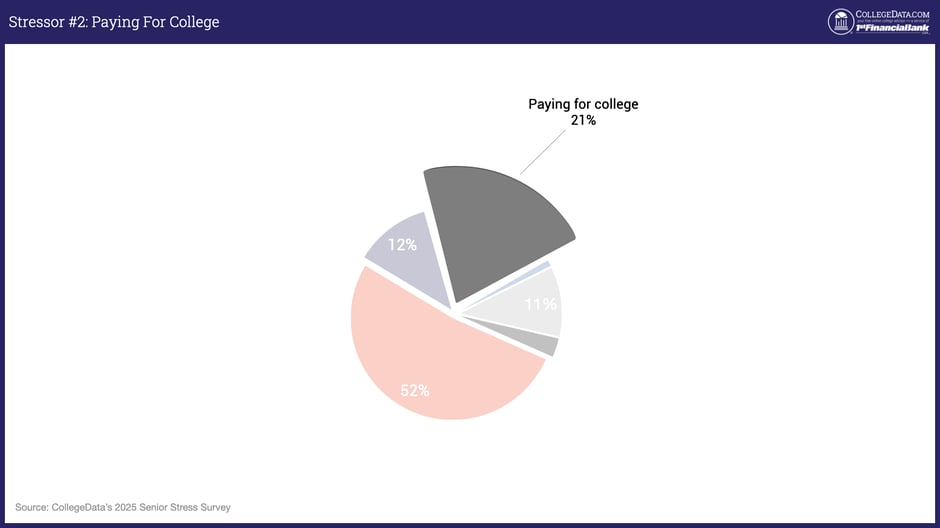
Of the students we surveyed, 21 percent said the most stressful aspect of applying to college was figuring out how to pay for it. “Between worrying about having to take out loans and if I’d get enough scholarships, the whole financial process was very stressful,” said one student.
Some students worry about saddling themselves or their parents with substantial amounts of debt. “Wanting to make sure that I wasn’t bringing my parents into insane amounts of debt was, and still is, a big stressor,” one student explained. “I want to reduce my financial burden as much as possible.”
Other students expressed concerns about not being able to afford the college of their dreams. “I had a hard time deciding whether I wanted to choose a cheaper school that gave me good scholarships or a more expensive school that I've always wanted to go to.”
STRESSOR #3: CLASS WORKLOAD and Rigor
While junior year of high school can be the most rigorous academic year for college-bound students, many high school seniors continue to take demanding Advanced Placement (“APs”), International Baccalaureate, and honors courses to impress colleges. Eleven percent of students surveyed said that academic workload was their biggest source of stress.
- “The academic workload completely overwhelmed me. No matter how much I worked, I felt like I was always behind.”
- “I feel like my teachers this year didn’t give me enough time to work on projects/assignments and in the end they all piled up and became overwhelming.”
- “Academically it was my worst year ever because of the amount of work I had to do.”
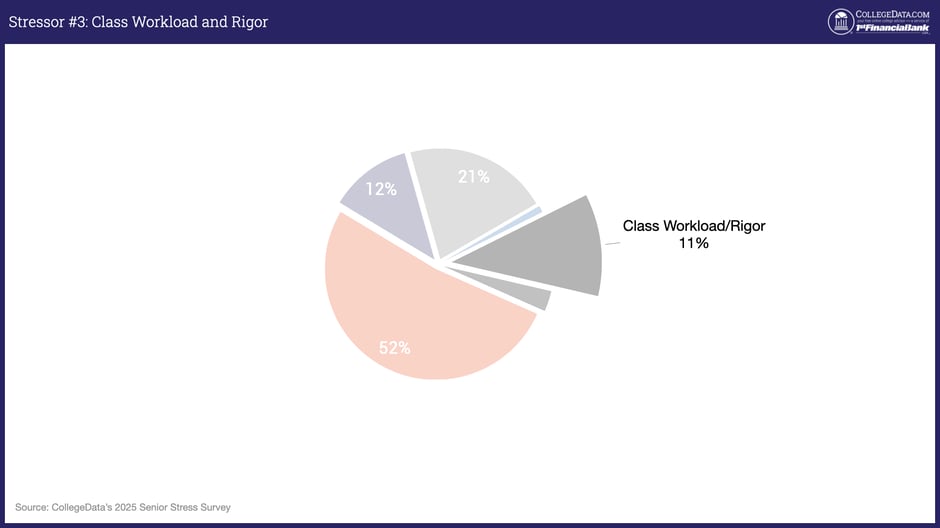
Stressor #4: SCHOOL/life balance
Senior year of high school can be busy enough without applying to college. By senior year, some students have reached top leadership positions in clubs, sports teams, jobs, youth groups, or other activities, and these activities may require a larger time commitment than previous years. It’s also the last year of high school, and many students want to spend time with their friends and participate in social activities that mark the end of their senior year.
Twelve percent of students found it stressful balancing the conflicting demands of senior year.
- “It’s senior year, so obviously you want to have fun. However, it’s senior year, so you also have to maintain your grades and do well in exams.”
- “There’s almost no social life if you’re focused on college apps and academics.”
- “I stopped enjoying things I used to love because guilt crept in any time I wasn’t studying.”
Senior year can also trigger conflict with friends and family. Since it can be a time of transition, relationships, roles, and expectations may begin to shift.
- “I felt like my parents were always nagging me and questioning me about applications and major choices and looking over me much more than previous years.
- “I felt I matured more than my friends this year and we had less in common.”
- “It was a lot to take in: workload, friendships, relationships, [and] the fact that this is it for high school.”
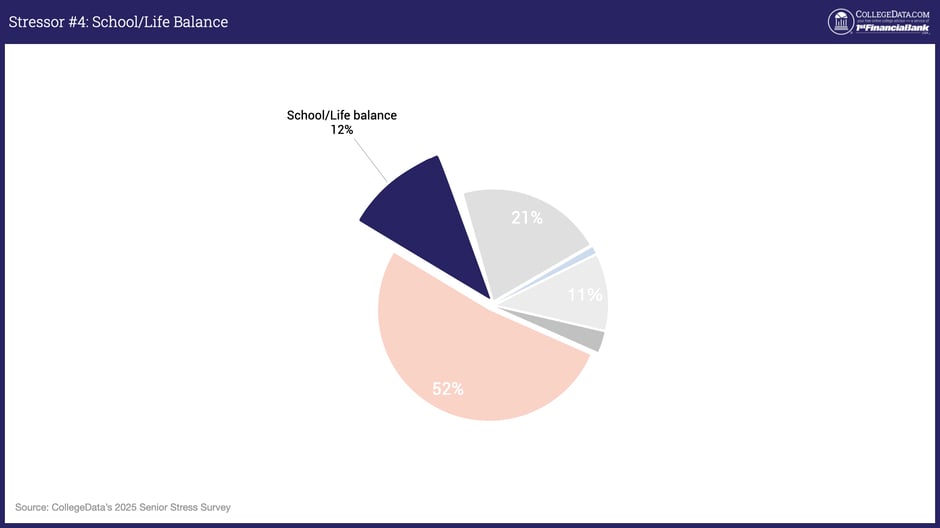
STRESSOR #5: Life after graduation
High school graduation is generally a time of celebration, but for a small percentage of the students we surveyed (3 percent), life after high school, especially navigating a new social environment at college, was their biggest source of stress.
- “I'm very anxious thinking about life after high school, losing friends and starting new.”
- “I will be leaving a lot of my friends behind as I move on to college, I also won’t know many people when I do go to college. I continuously stressed about this throughout the year.”
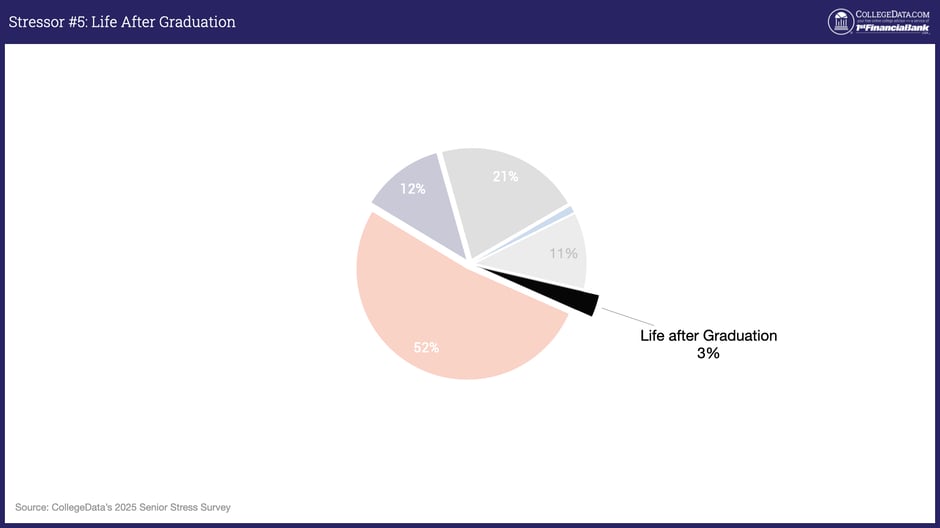
HOW DID STRESS AFFECT HIGH SCHOOL SENIORS?
Stress can impact students in myriad ways, affecting their academic performance; physical, mental and emotional health and well-being; and social relationships. Over half of the students we surveyed (52 percent) said that stress had the biggest impact on their mental and emotional state.
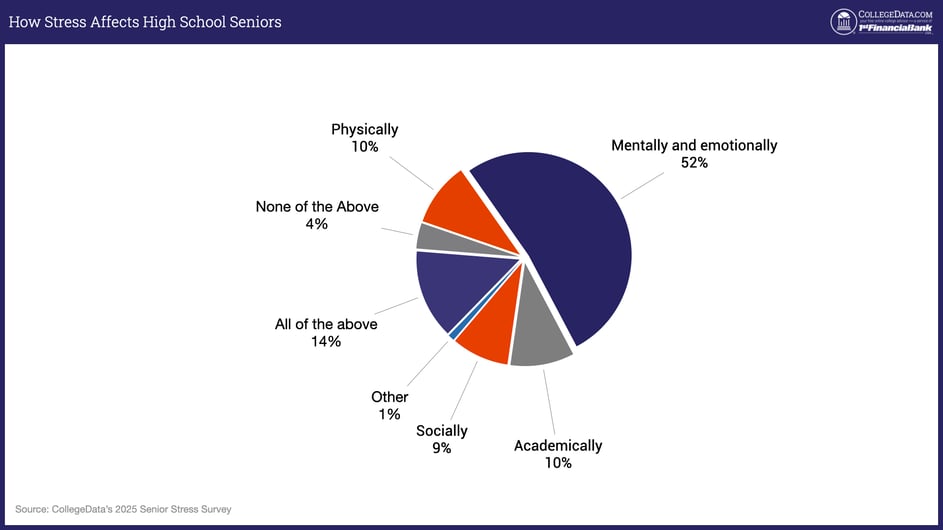
“My mental state was definitely different than other years,” said one student. “I was more overwhelmed and confused.” Another student said, “My mind felt crowded all the time. I couldn’t focus, and overthinking became a daily habit. I’d start questioning every choice I made, and sometimes it felt like I was running on autopilot just to survive the day.”
Another 14 percent said stress affected them in multiple areas: physically, mentally, academically, and socially.
- “I was extremely tired all of the time because of stress.”
- “I gained weight and slept an unhealthy amount.”
- “Socially, I pulled away from a lot of people. I didn’t mean to, but I just didn’t have the energy to be present. My friends were going through their own stress too, and it felt like we were all just trying to keep up.”
- “My stress usually caused a lack of sleep, lack of appetite, nausea, body aches [and] pain just in general.”
STRESS AND PROCRASTINATION IN COLLEGE APPLICATIONS
Stress and procrastination have a cyclical relationship: Feeling anxious about completing a task can lead to procrastination, and procrastinating to complete a task can cause stress. Because many high school seniors find various aspects of applying to college stressful, it’s not surprising that they procrastinate during the college application process. As one student explained, “Procrastination led to me feeling like I always had something to do, but not enough motivation to do it.”
Which college admissions tasks did students procrastinate on most? About (57 percent) said college essays. Students also admitted to procrastinating on asking for letters of recommendation (37 percent), completing financial aid forms (34 percent), researching colleges (22 percent), and starting their applications (33 percent).
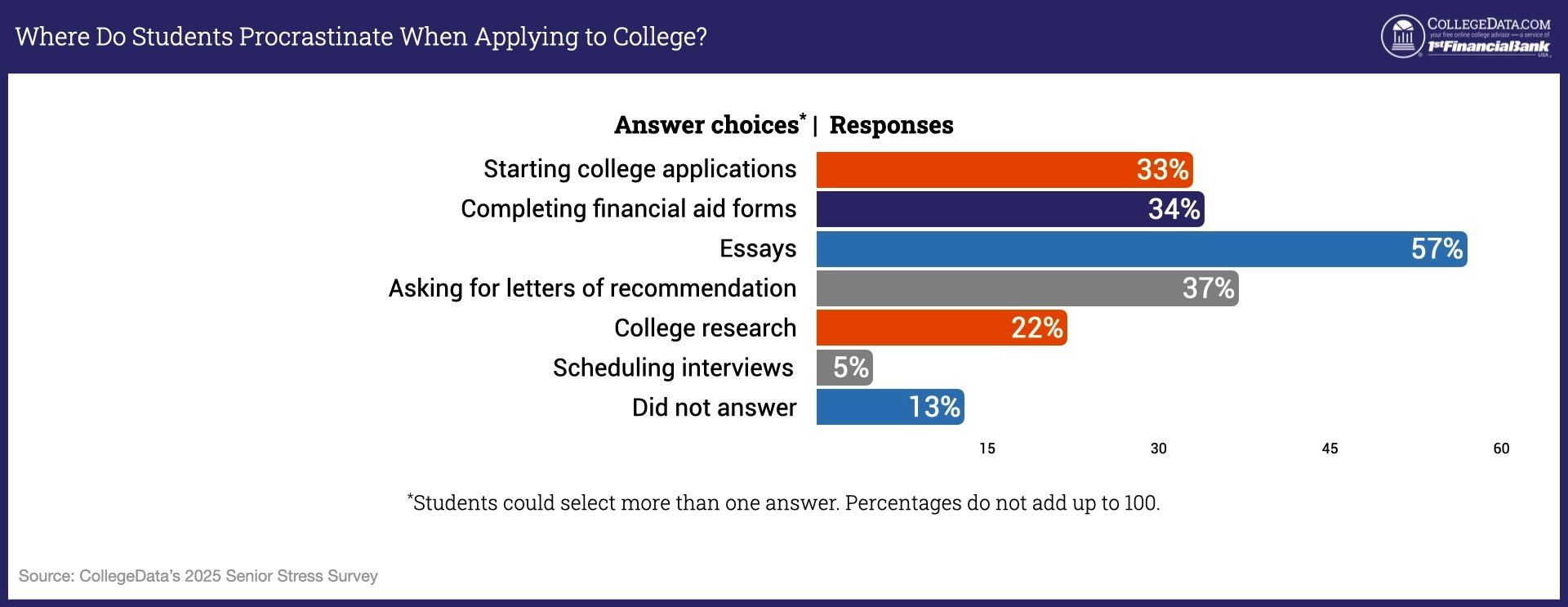
HOW MUCH STRESS ARE HIGH SCHOOL SENIORS FEELING?
We asked students to rate several stress factors on a scale from 1 to 10, with 10 being “extremely stressful.” The highest percentage of students (37 percent) rated “paying for college” at level 10, while 31 percent gave the highest rating to “the thought of not getting into your first-choice college.” Another 28 percent gave the highest rating to “managing schoolwork, extracurriculars, and college applications.”
Although the college admissions landscape can be competitive, the students we surveyed were fairly confident they would get accepted to college, at least somewhere. For almost 60 percent, “the thought of not getting into any college” gave them little to no stress.
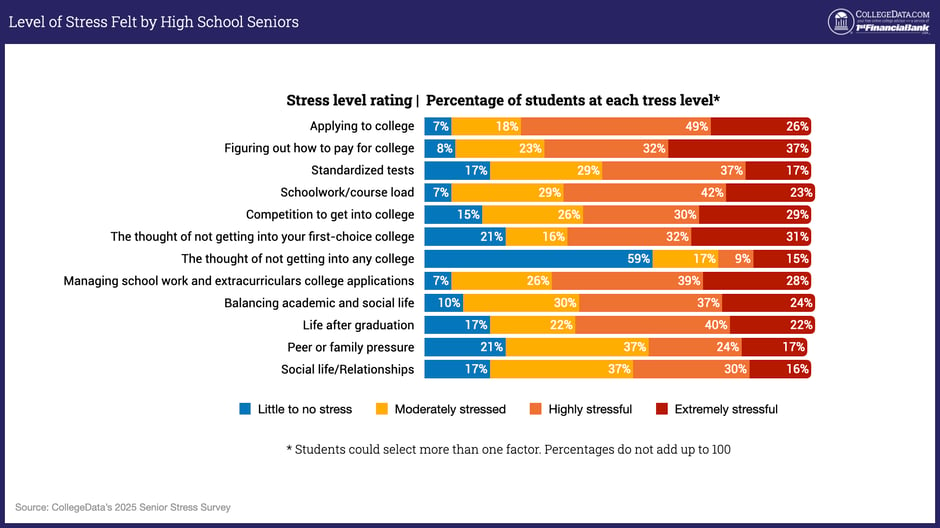
How Do high School Seniors Cope with StresS?
When asked what specific things they did to alleviate their stress, 56 percent of respondents mentioned seeking the advice and support of adults or peers. Another 44 percent said listening to music was their remedy of choice.
Other stress-busting methods students used included staying socially connected (27 percent), sleeping more (23 percent), and going online (22 percent). Some students (14 percent) eliminated one or more extra-curricular activities to reduce stress or relied on meditation and exercise (13 percent). Another 6 percent disconnected from social media to reduce the amount of stress they were feeling. However, a little over 17 percent said they did nothing to try to eliminate their stress.
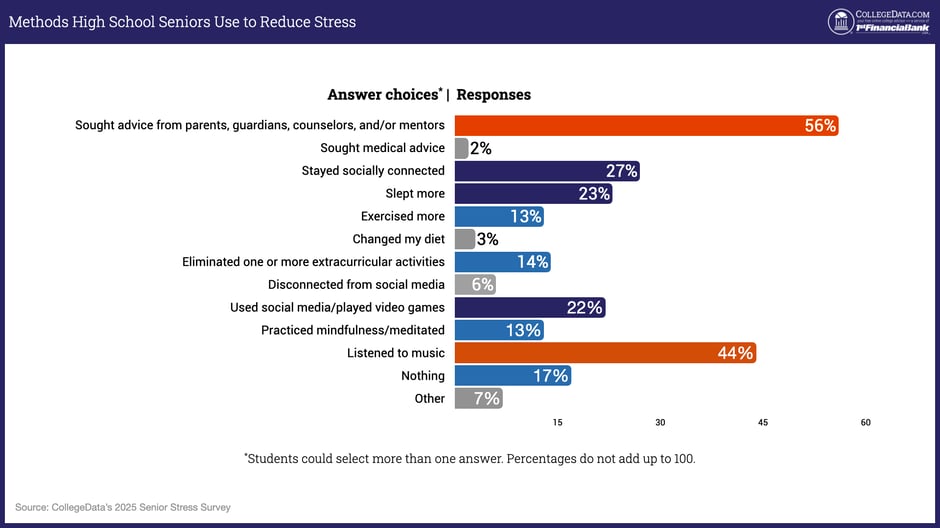
As reported above, most of our survey respondents reached out to other people in their lives to help them deal with senior-year stress. Most survey respondents said they relied on friends (44 percent) and parents (43 percent) for help. Another 32 percent said that they reached out to teachers or counselors. However, almost 13 percent of survey respondents said they did not talk to anyone about the stress they experienced during senior year.
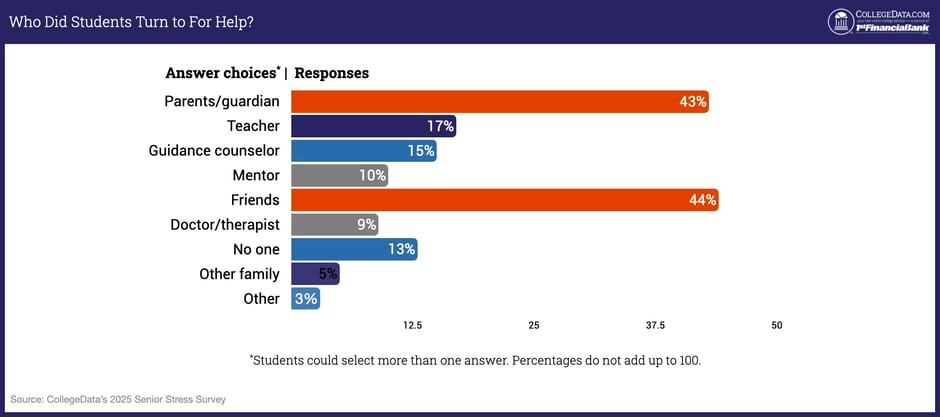
COLLEGEDATA STUDENTS SHARE THEIR ADVICE FOR COPING WITH SENIOR-YEAR STRESS
Here is some of the advice CollegeData users wanted to share with high school students on handling stress senior year.
- “Share your load; others may offer insights, practical help, or simply validation of your feelings. You don't have to carry the entire burden in isolation.”
- “Understand that this intense period, no matter how overwhelming it feels, is temporary. Your entire future isn't solely defined by the outcome of this one challenge or decision, and there are always multiple paths to success.”
- “Don’t let the stress cause you to drift away from the people around you; this is when your circle is the most important to rely on.”
- “Find something you enjoy, whether it’s a hobby, activity, or interest, so long as it’s low stakes. Whenever you have time to spare, do that activity/hobby or dig into that interest just for fun and to relax!”
- “Amongst the chaos, take a step back, breathe, and enjoy the time you are in. It is time you will love and hate, so enjoy the bittersweet.”
- “There is no way around the hard work. Embrace it.”
- “Not getting into your #1 college isn't the end of the world because at the end of the day, college is nearly the same everywhere and no matter what university you go to, you can still succeed.”
- “Just know you aren't alone. Make sure to cherish and uphold the people that care about you and reciprocate.”
- “It may be hard right now, but trust me when you get those acceptance letters, it’ll all be worth it.”
We hope you’ll keep these survey results, student experiences, and advice in mind as you progress through your senior year of high school. Remember that stress is a normal human reaction. As these survey results show, if you are feeling stressed out senior year, you’re not alone. If you are feeling stressed, consider reaching out to friends, family or other adults you know.
*Methodology: Survey results presented in this article were generated from an email survey of CollegeData registered users. The survey was sent to students who graduated high school in 2025. A total of 115 CollegeData registrants completed the survey. Responses were provided anonymously.



